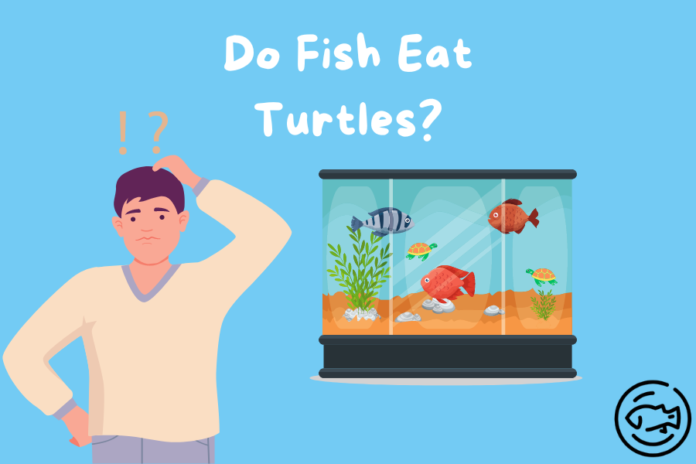“Do fish eat turtles?” This straightforward question might pop up in your mind when you observe the lively world underwater and notice turtles and fish sharing the same space.
Turtles often swim in the same places as fish do, especially with predatory fish like bass and northern pike. Being in such close quarters puts the turtles at risk of becoming a meal.
Many fish, including bass and catfish, won’t think twice about eating a small turtle if it fits in their mouth.
So, sit back and relax as we will talk more about these facts and the interesting relationship between the fish and the turtles in this post below.
Do Fish Eat Turtles?
The fish species that consume turtles are a topic of interest in the intricate relationship between these two aquatic organisms. Understanding the specific types of fish that prey on turtles is crucial in comprehending the dynamics of their interaction.
- Bass: Among the variety of fish species that consume turtles, bass are notable predators.
- Catfish: Another significant group of fish known for their appetite for turtles are catfish.
- Pike & Muskie: These predatory fishes are also known to include turtles in their diet.
Furthermore, other species may not be mentioned above, which can also be categorized as types of fish that eat turtles.
It is worth noting that each turtle-fish interaction yields unique details, adding to the complexity and intrigue surrounding this fascinating relationship.
An analysis found that certain types of fish, including bass and catfish, have been observed consuming turtles.
Don’t underestimate bass, they may be great at music, but they’re even better at eating turtles.
Bass
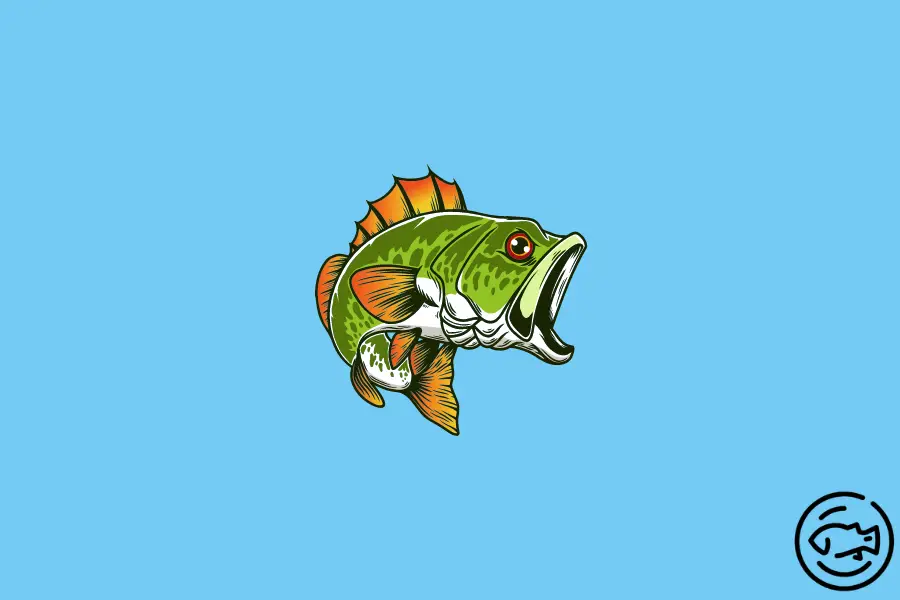
Below is a table highlighting some key information about bass:
| Characteristics | Details |
|---|---|
| Habitat | Freshwater lakes, rivers, ponds |
| Diet | Small fish, insects, crustaceans, amphibians |
| Size | Varies depending on the species |
| Reproduction | Spawning in shallow water during spring or summer |
Bass, one of the most famous predator fish in North America, are known for their surprise-attack hunting style and their tendency to eat a wide variety of odd things they can gulp down.
One of these odd meals is turtles, and it’s not uncommon for bass to prey on small turtles that dare to traverse their territory.
Interestingly, a stationary turtle doesn’t attract the bass’s attention much. However, once the turtle starts to swim, the bass becomes more aggressive and predatory.
Apart from their ability to eat small turtles, bass also have a key part in keeping the balance of nature in their living spaces.
To catch more bass when you go fishing, think about using lures that float on the surface or try using live bait. Trying out different kinds of bait can show you what the bass like best in certain fishing situations.
With their hunting habits and key role in water-based ecosystems, bass are of great interest to both people who love fishing and those who study animals.
Catfish
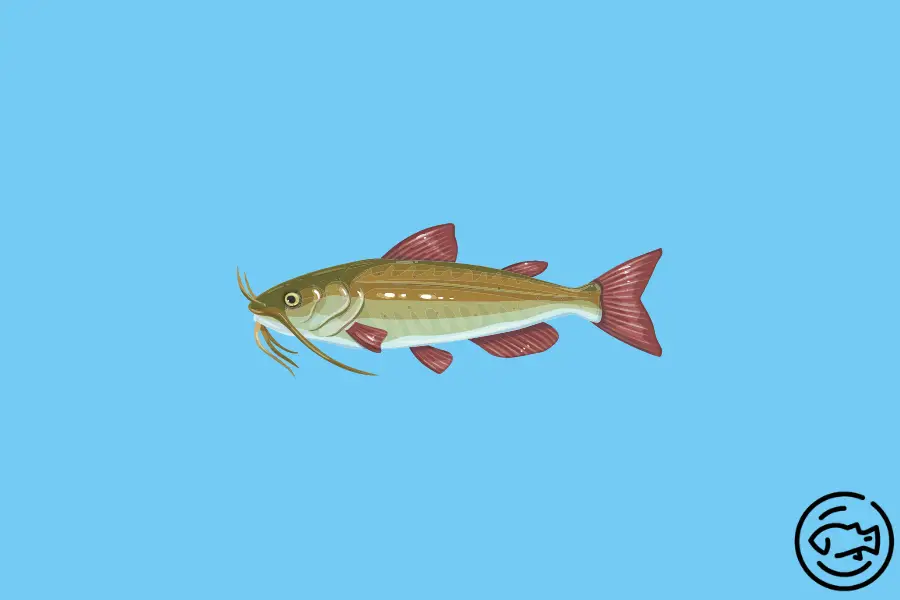
Here is a table highlighting some key information about catfish and their relationship with turtles:
| Catfish Species | Predatory Behavior towards Turtles |
|---|---|
| Channel Catfish | Known to actively hunt and consume small turtles |
| Flathead Catfish | Often preys on young turtles and eggs |
| Blue Catfish | Feeds on turtle hatchlings and smaller individuals |
It is interesting to note that different species of catfish exhibit different predatory behaviors towards turtles. While channel catfish actively hunt and consume tiny turtles, flathead catfish primarily prey on young turtles and their eggs. Blue catfish, on the other hand, mainly feed on turtle hatchlings and smaller individuals.
These unique details shed light on the diversity of interactions between catfish and turtles in their ecosystem. Understanding these dynamics can help researchers better comprehend the intricate relationship between these two aquatic organisms.
Pike & Muskie
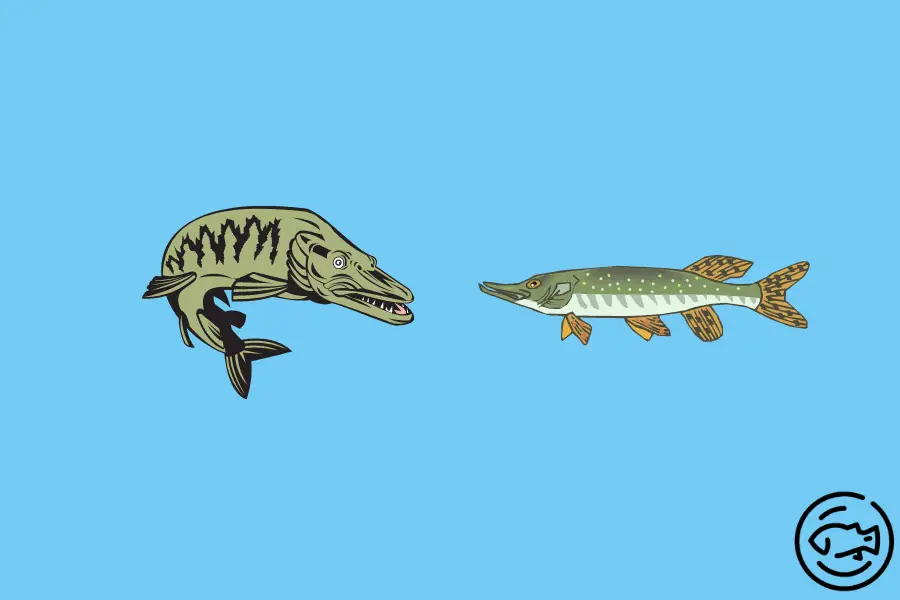
| Fish Species | Diet |
| Pike | Turtles, Fish, Amphibians, Birds |
| Muskie | Turtles, Fish, Birds, Small Mammals |
These fish possess impressive hunting skills that allow them to prey on various species, including turtles. Their ability to consume turtles serves as evidence of the fierce nature and predatory behavior exhibited by the pike & muskie.
Don’t miss out on understanding the intriguing relationship between these formidable fish predators – pike & muskie – and their consumption of turtles. Explore the fascinating dynamics and discover more about their feeding habits in the following sections.
Fish have a hard time swallowing turtles whole, but given enough time and determination, they can definitely take a bite out of the turtle soup industry.
also read: Do Fish Have Brains? – How Do They Think!
Using Turtles as Bait
One of the most underappreciated baits is undoubtedly the turtle. As pointed out earlier, bass have no problem pouncing on turtles that are on the move.
A handful of companies produce turtle lures, but they’re not as well-known as other lure varieties.
You use these lures just like you would any other. The goal is to generate enough activity to pique the bass’s interest.
When I’m fishing with a turtle lure, I prefer to give it a tug and wind it up instead of just a simple straight pull. I’ve noticed that this method leads to a lot more successful catches.
Turtle Lures and Their Effectiveness
The effectiveness of turtle lures in enticing fish is a topic of interest. Here, we delve into the various aspects that make turtle lures successful in attracting fish.
- Attractiveness: Turtle lures have special features and copy the look and movements of real turtles, which makes them very attractive to fish.
- Lifelike Action: Turtle lures are made to copy how turtles swim naturally, making a real-like action that draws in hunting fish.
- Durability: Made from high-quality materials, turtle lures are strong enough to handle tough fishing conditions and can be used over and over again.
As someone who likes to fish and wants to catch more on your trips, using turtle lures in your fishing gear could be a good idea.
Techniques for Fishing with Turtle Lures
Lunkerhunt Prop Fishing Lure Kit (3-Pack)
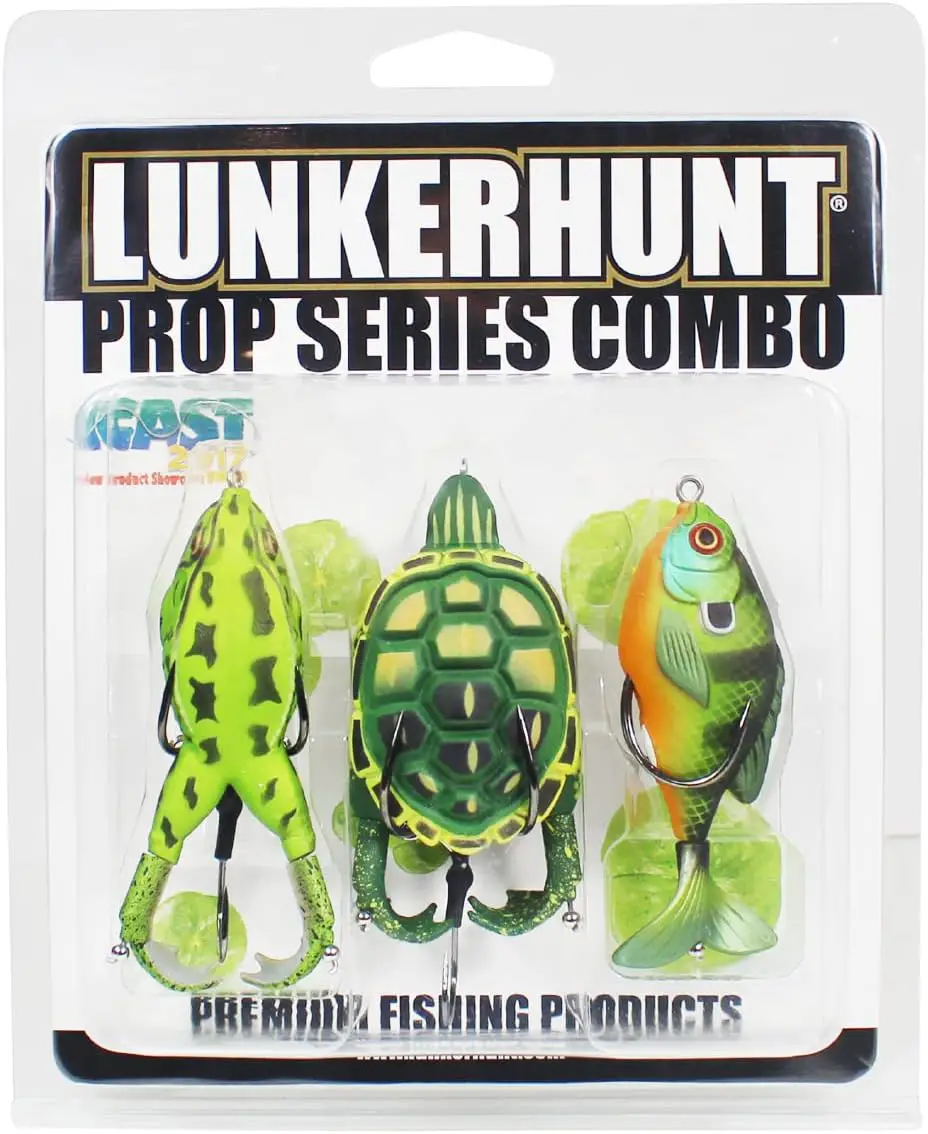
- 3 Prop Fishing Lures: Hollow, soft, weedless design with sharp hooks and high-quality patterns.
- 3-Pack Combo: Includes Prop Frog, Prop Turtle, and Prop Sunfish.
- Topwater Action: Attracts bass and trout, enhances hook-up rate.
- Hollow Body Baits: Light, realistic swimming action for aggressive bites and secure hook-ups.
- Attention-Catching Prop Baits: Generates sound vibrations. The kit includes single and double loud props.
The methods for utilizing turtle lures in fishing endeavors are of great interest. Here are three key points to consider when employing techniques for fishing with turtle lures:
- Lure Selection: Choosing the appropriate turtle lure is crucial. The lure’s size, color, and movement should mimic the natural behavior of turtles, effectively attracting fish toward the bait.
- Presentation Techniques: Once the turtle lure is selected, anglers must master specific presentation techniques to maximize their chances of success. This includes casting the lure in areas known for abundant fish activity and employing various retrieval methods to imitate the movement patterns of live turtles.
- Patience and Observation: Fishing with turtle lures requires patience and careful observation. Anglers need to study fish behavior and adjust their techniques accordingly. By closely monitoring water conditions, identifying feeding patterns, and adapting tactics as necessary, anglers can increase their chances of attracting fish with turtle lures.
It is essential to note the unique details related to fishing with turtle lures that haven’t been explored previously in this article. These aspects include underwater visibility conditions affecting lure effectiveness, the impact of local ecosystems on fish-turtle interactions, and how different species of fish may respond differently to various types of turtle lures.
Conclusion
Certain fish, such as bass and catfish, eat just about anything they can swallow, including turtles and birds.
Turtles frequently live in the same waters as these fish. Yet, more often than not, fish will go after a more leisurely meal.
Turtles aren’t the primary food for fish, but a fish won’t pass up the chance to eat a turtle if it gets one. Many fishing enthusiasts have noticed this and have successfully used turtle-shaped bait to catch fish successfully.
Key Takeaway:
- Fish do eat turtles: Some species of fish, such as bass, catfish, and pike/muskie, are known to feed on turtles.
- Specific fish species are more likely to eat turtles: Bass, catfish, and pike/muskie are examples of fish species known to prey on turtles.
- Fish may have difficulties digesting large turtles: While fish can digest smaller turtles, they may face difficulties when digesting more giant turtles.
- Turtles can be used as bait for fishing: Turtle lures can effectively attract fish, and there are specific techniques for fishing with turtle lures.
- The relationship between fish and turtles varies depending on species and circumstances: While some fish eat turtles and can be used as bait, the relationship between fish and turtles is complex and depends on various factors.
FAQs About Do Fish Eat Turtles?
Do fish eat turtles?
Specific fish species like bass, catfish, pike, and muskie are known to eat turtles if the opportunity arises.
What kind of fish eat turtles?
Predatory fish such as bass, catfish, pike, and muskie are likelier to eat turtles, especially small or baby ones.
Can fish digest turtles?
Fish can digest tiny or baby turtles because they have softer shells. However, larger turtles have a more rigid shell that fish cannot digest.
Are turtles a standard part of a fish’s diet?
Turtles do not make up the central part of a fish’s diet. Fish typically prefer more leisurely meals and will only eat a turtle if the opportunity presents itself.
Can you use turtles as bait for fishing?
Yes, turtles can be used as bait for fishing, mainly when targeting fish like bass that are known to feed on moving turtles. Turtle lures are available for this purpose.


